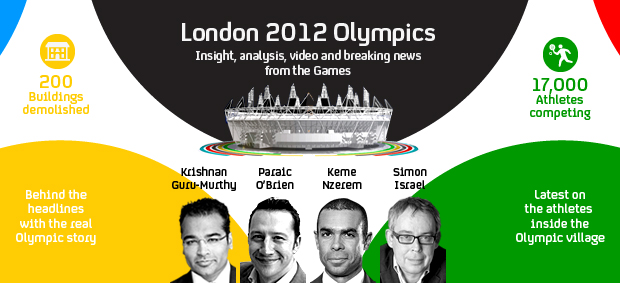A fabulous Games – but what is the legacy?
A major element of London’s bid to host the Games was a commitment to a lasting legacy. Channel 4 News looks at what we will have to help us remember what Jacques Rogge called a “fabulous” Olympics.

The Olympic park (to be renamed Queen Elizabeth Olympic Park)
Before becoming the location for 2012’s hugely succesful Olympic games, the land on which the Olympic Park is built was industrial wasteland, the legacy of Britain’s industrial past (as so vividly portrayed in the opening ceremony). The 559-acre plot is intended to become home to a new community with around 8,000 homes, shops, offices and, for the moment at least, world-class sports facilities. The athletes’ village will at least in part provide affordable housing as well as private accommodation.
The investment ploughed into the transport links for the games means Stratford is now a major hub for the east of the capital. The Aquatics Centre will remain, as will the Arcelor Mittal Orbit sculpture. The future of the Olympic stadium, which has been the subject of a row between would-be occupants Tottenham Hotspur and West Ham United football clubs, is undecided at present.
The “multi-use arena”, which played host to handball and basketball, is already being marketed by the London Legacy Development Corporation, which suggests it might be suitable for “tournaments or trade shows, conferences, gigs or gala dinners” and – perhaps with its tongue in its cheek – “even Cabinet meetings”.
Sporting legacy
The government has announced it will maintain UK Sport funding at pre-Olympics levels of £125m per year until the next Games in Rio but there are concerns that may not be enough to ensure the future Team GB strikes gold as regularly as at London 2012.
I expect we will see an increase in pride in being the host nation and this will translate into pride amongst communities. Dr Andrew Kuczmierczyk
Other Games such as those in Los Angeles in 1984 continue to bequeath sporting benefits for local communities. The LA84 Foundation was set up with surplus funds from the LA games and to date, estimates more than 2.5 million boys and girls and more than 1,000 youth sports organisations throughout southern California have benefited from its grants.
Inspired by this example, the charity London Funders wants to double any money it can get from lottery or unspent London Games contingency funding. This would be invested to form an endowed fund to support community sports organisations which may be left out of current funding schemes. The intention would be to roll out the project across the UK eventually.
In its feasibility study for the idea, it quotes a local authority officer saying: “2013 could prove to be a cliff edge in terms of local authority funding for many grassroots sporting organisations in London”. The organisation warns there is a danger people may become less, not more, active after the games.
That concern is reinforced by Sport England’s failure to reach its target of getting 2 million people into regular sport before the start of the Games. But a survey by Sport England found that only 110,000 people of a target of 1 million took part regularly in sport.
Meanwhile, data analysis by Channel 4 News showed that over one third of 2012 British medallists went to non-state schools, with only 7 per cent of the general population being educated privately. Critics say this is proof of the inadequacy of state school sports facilities and mentoring.
But top-class facilities, such as the Aquatics Centre and Eton Dorney (privately owned by Eton College) rowing venue, should provide at least some incentive to get involved in sport and prepare for the London 2017 World Athletics Championships.
Happiness
Anecdotally, it seems the actual arrival of the Games did much to lift the pre-Games tension which consumed many media commentators. After an uplifting opening ceremony, the country got down to the serious business of supporting Team GB.
Whether or not there will be a lasting, measurable effect is another matter. The Office of National Statistics which conducts the government’s surveys into national well-being, told Channel 4 News it is unlikely to be able to draw out the impact of the Olympics on the mood of those people it polls, because the questions its surveys asks are not specific enough.
But looking into his crystal ball at the time of the royal wedding in 2011, psychologist Dr Andrew Kuczmierczyk from City University London told the ONS: “The 2012 Olympics provides a real opportunity to create a sense of identification and affiliation with a common cause. I expect we will see an increase in pride in being the host nation and this will translate into pride amongst communities and within individuals.”
Perhaps we will never know for sure if the Olympics did boost our happiness. But if nothing else, it helped us – at least for a short time – forget words like “eurocrisis“, “double dip” and “austerity“.
-
Latest news
-
As India goes to the polls in the world’s largest election – what do British-Indians think?6m

-
Tees Valley: Meet the candidates in one of the biggest contests coming up in May’s local elections4m

-
Keir Starmer says public sector reform will be a struggle7m

-
Nicola Sturgeon’s husband Peter Murrell charged with embezzlement of funds from SNP1m

-
Ukraine might finally get $60billion in American weapons and assistance to defend against Russia3m

-





